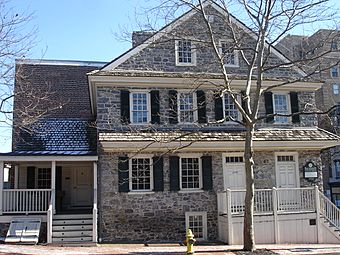Easton House facts for kids
Quick facts for kids |
|
|
Easton House
|
|

The Easton House in January, 2013
|
|
| Location | 167–169 Northampton St., Easton, Pennsylvania |
|---|---|
| Area | 0.1 acres (0.040 ha) |
| Built | 1754, 1765, 1828 |
| Architect | William Parsons |
| Architectural style | Delaware Valley Georgian |
| NRHP reference No. | 80003583 |
| Added to NRHP | December 3, 1980 |
The Easton House, also known as the Bachmann Publick House, is a very old and important building in Easton, Pennsylvania. It's a historic inn (a place where travelers could stay) and tavern (a place to eat and drink). This building has a long history, dating back to the 1700s, and has been part of many important events in the area.
Contents
What is the Easton House?
The Easton House was first built in 1753. It's made from strong, rough limestone rocks, which gives it a unique look. The building has about two and three-quarter stories, meaning it's almost three floors tall. Its style is called Georgian, which was popular in the 1700s. This style often includes balanced shapes and classic details.
A Look at Its History
The Easton House has changed and grown over many years. It started as a simple building and became more important as time went on.
George Taylor's Home
In 1765, a very important person named George Taylor expanded the Easton House. George Taylor was a famous politician who even signed the Declaration of Independence! He used the building as his home and also as a tavern. Imagine living in a place where people came to eat, drink, and share news!
A Place for Justice
Later, in 1828, a new part was added to the house. This addition was made of red clay bricks. In the early 1800s, the Easton House became even more important. It was used as the Magistrates Court. This means that important legal meetings and decisions happened right inside its walls. It was a place where justice was served for the community.
Becoming a Historic Landmark
Because of its long history and its connection to important people and events, the Easton House was recognized as a special place. On December 3, 1980, it was added to the National Register of Historic Places. This is a list of buildings, sites, and objects that are important in American history. Being on this list helps protect the building and makes sure its history is remembered for future generations.



